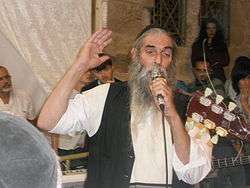Dov Shurin
Dov Shurin (Hebrew: דב שורין) is an Israeli singer-songwriter, who is also known for his far-right political views, conveyed both through his music and media appearances, related to the Jewish sovereignty of Israel and the settlement of occupied territories in the region.
Dov Shurin | |
|---|---|
 Dov Shurin at David's Tomb, Jerusalem, 2010 | |
| Background information | |
| Born | 1949 Brooklyn, New York City, U.S. |
| Genres | Jewish |
| Instruments | Guitar |
| Website | http://www.dovshurin.com/ |
Background
Born in 1949, Shurin moved from Brooklyn, New York to Israel in 1984.[1] He is an Orthodox Jew and a grandson of Rabbi Yaakov Kamenetsky.[2]
He currently lives in the Sansur building in downtown Jerusalem.[3]
Musical style
Shurin's music ranges from soft folk ballads to electric guitar, fast-paced, danceable music. His lyrics range from original to biblical sources or a mashup of the two. A major hit of his was "Zochreini Na" (Hebrew: זכרני נא).[4] The lyrics of the song are the prayer of Samson asking God to restore his strength so he can exact his revenge upon Philistines who had captured and blinded him (Book of Judges 16, 28). The song was initially popular mainly on Israeli settlements before gradually spreading to non-settler circles.[5]
Shurin is noted for his Kahanist political views.[6] The struggle for the Land of Israel is a recurring theme in his music.[7]
Media appearances
He was featured on the cover of The Economist with a Bible in one hand and an Uzi in the other.[8]
Shurin has been featured in documentaries and briefly became a pop star within the settler movement with songs calling for violence against the Palestinians and resistance to Israel's 2005 withdrawal from the Gaza Strip.[3]
Shurin featured in Settlers, a documentary made in 2002 by British director Sean McAllister.[9] In the film Shurin states that although he believes that the Land of Israel belongs solely to the Jewish people, he has no problem being friendly with individual Arabs. A scene shows Shurin interceding on behalf of an elderly Arab man who was stopped at the Western Wall Plaza by Israeli security; Shurin stated that he is proud of what he did and that this deed was a Mitzvah.
A 2011 documentary by Louis Theroux called The Ultra Zionists featured Shurin's music.
Discography
- Kol Dodi: Voice of my Love (1980)
- Chakal Tapuchim: The field of Sacred Apples (1984), with Dovid Lybush
- Madly In Love With The One Above (1999)
- Biblical Revenge (2002), Aderet Music Corp.
- Charming Nation (2011)
References
- http://www.bhol.co.il/forum/topic.asp?topic_id=206862&forum_id=771
- Bio of R' Yisroel Shurin, Reprinted from Ya'ated Neeman, 2007
- Three storeys - and a nation - built by tragedy, Mark MacKinnon. Mar. 28, 2009, Globe and Mail
- The Jewish Insights
- Ettinger, Yair (29 September 2003). "God and love and rock 'n' roll". Haaretz. Retrieved 7 May 2012.
- Kahane followers: radical Jews in garb of American counterculture Archived 2013-09-07 at Archive.today Charles Levinson and Michael Blum, Sawf News
- Friedman, Yoav (14 September 2008). "Dov Shurin's disengagement". Ynetnews. Retrieved 7 May 2012.
- Doc visits West Bank mess. Nov 24, 2000, Toronto Star
- "Sean McAllister - Films, Settlers (2000)". Archived from the original on 2 October 2013. Retrieved 7 September 2013.